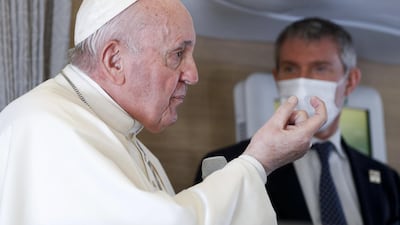Pope Francis said on Monday that he considered the risks of travelling to Iraq during the Covid-19 pandemic, but he decided to go ahead with it after much prayer and belief that God would look after the Iraqis who came out to see him.
Pope Francis, who flew back to Rome on Monday, explained why he chose to make the four-day visit, which featured often maskless crowds in packed churches.
The Pope said the idea of a trip "cooks over time in my conscience" and that the pandemic was the issue that weighed most heavily on him.
“I prayed a lot about this and in the end I took the decision freely,” Pope Francis said. “It came from inside. I said: ‘He who makes me decide this way will look after the people.'
“I took the decision this way, but after prayer and knowing the risks."
The first papal trip to Iraq ended on Monday and the event aimed to bring hope to the country's marginalised Christian minority while boosting relations with the Muslim world.
Supporting Iraqi Christians
At every turn of his trip, Pope Francis urged Iraqis to embrace diversity – from Najaf in the south, where he held a historic face-to-face meeting with Shiite cleric Ayatollah Ali Al Sistani, to Nineveh to the north, where he met Christian victims of ISIS and heard their stories of survival.
In between those trips, the pope led an interfaith ceremony on the plain of Ur, near the archeological ruins of the House of Abraham, thought to be the birthplace of the prophet of the Abrahamic religions.
Pope Francis said he prayed about the decision to go to Iraq and hoped he would soon be able to resume public appearances at the Vatican, which have been suspended for months because of the pandemic.
He also suggested he could travel to Lebanon.
He said Covid-19 restrictions left him feeling “a bit imprisoned” but that the tour of Iraq made him feel alive again “because it’s touching the Church, the holy people of God”.
Meeting Ayatollah Ali Al Sistani
In one of the historic moments of the trip, he was invited into the home of Mr Al Sistani, among the most influential Shiite clerics.
The cleric said the two men discussed the "great challenges that humanity faces in this era and the role of faith in God all mighty and his messages and commitment to high moral values in overcoming them".
The Vatican hopes the message of unity can help preserve the place of the thinning Christian population in Iraq’s tapestry of faiths and ethnic groups.
Pope Francis said he was honoured to be received by Mr Al Sistani, 90, whom he called "a great man, a wise man, a man of God".
"He was very respectful," Pope Francis said.
“He never stands up for the greeting. He stood up to greet me – twice,” Pope Francis said.
“This meeting was good for my soul. He is a luminary.”
Pope Francis considered the meeting to be the second major step forward in the Vatican's interfaith efforts with Muslims.
The Pope signed the Document on Human Fraternity with the Grand Imam of Al Azhar Dr Ahmed Al Tayeb during a historic trip to Abu Dhabi in 2019.
Pope Francis also responded to critics who questioned his efforts to strengthen ties with other faiths.
“Sometimes you have to take risks to take steps forward," he said.
"These are risks that you take in prayer and in dialogue, in seeking advice and in reflection. They are not whims."
But the trip was taxing on the 84-year-old pontiff, whose sciatica nerve pain was apparently flaring up and it made him walk with a pronounced limp.
He said he was not sure whether he would have to slow the pace of future trips.
“I do confess that on this trip I got a lot more tired than during other ones,” he said.
He said it may have been because of his age. “It’s a consequence. But we’ll see."
His next journey could be to Budapest, Hungary, where he will attend the end of an international Eucharistic conference in September, with a possible trip to Bratislava, Slovakia, as part of his itinerary, he said.
Otherwise, the only other trip he promised to make is to Lebanon, although he did not suggest a timetable.
“Lebanon is suffering,” Pope Francis said, referring to its political, economic, social and coronavirus crises.
He said he was asked by the head of Lebanon’s Maronite Christian Church, Patriarch Bechara Rai, to schedule a trip to Beirut while he was in the region.
Pope Francis said he declined the request because he felt he would be offering crumbs to the people of Lebanon as they faced several major problems.
“But I wrote him a letter and promised I’d go to Lebanon,” the pontiff said.







































































